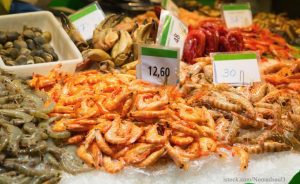October is National Seafood Month. Fish and seafood are a healthy part of a balanced diet and, as with all foods, proper handling and preparation are key to reducing the risk of food poisoning. Here are some tips from the U.S. Food and Drug Administration.
Buying Fresh Fish
 Does something smell fishy? Don’t buy it. Fish should not smell fishy, sour or like ammonia. Whole fish should have firm, shiny flesh; clear, slightly bulged eyes and red gills that are not slimy. Shrimp should also be odorless. And shrimp flesh should be shiny and translucent. Don’t buy seafood that is not refrigerated or displayed on a bed of ice.
Does something smell fishy? Don’t buy it. Fish should not smell fishy, sour or like ammonia. Whole fish should have firm, shiny flesh; clear, slightly bulged eyes and red gills that are not slimy. Shrimp should also be odorless. And shrimp flesh should be shiny and translucent. Don’t buy seafood that is not refrigerated or displayed on a bed of ice.
Buying Fresh Shellfish
Look for labels or tags on sacks of live shellfish. These tags have information such as the processor’s certification number, which means that the shellfish were harvested and processed in accordance with national shellfish safety controls. Don’t buy shellfish with cracked or broken shells. Try the “Tap Test.” If the clam, oyster, or mussel doesn’t close when you tap it, don’t buy it. With live crabs and lobsters, check for leg movement.
Storing Seafood and Fish
Put fish and seafood on ice, in the refrigerator or in the freezer as soon after buying it as possible. If you plan to use it within two days, store it in the refrigerator. If not, wrap it tightly in carefully with plastic wrap or foil and put it in the freezer.
Preparing Seafood
Thaw frozen seafood in the refrigerator overnight. For a quick thaw, seal it in a plastic bag and immerse it in cold water. Cook seafood to an internal temperature of 145ºF. Fish flesh should be opaque and separate easily with a fork. Shrimp and lobster flesh should be pearly and opaque. Scallop flesh should be opaque and firm.The shells of clams, mussels, and oysters should open during cooking. Throw out ones that don’t open.
Raw seafood that is s spoiled can have an ammonia odor which becomes stronger after cooking. If you smell an ammonia odor in raw or cooked seafood, don’t eat it.




